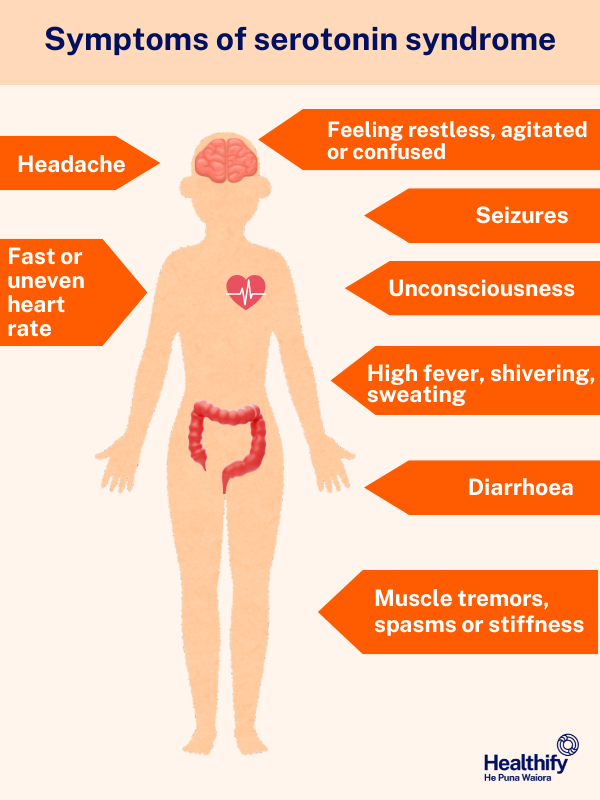If you're a frequent visitor to Healthify, why not share our site with a friend? Don't forget you can also browse Healthify without using your phone data.
Serotonin syndrome
Also called serotonin toxicity
Key points about serotonin syndrome
- Serotonin is a chemical produced in the body. It's needed for nerve cell and brain function.
- Serotonin syndrome, also called serotonin toxicity, occurs when the level of serotonin in your body gets too high.
- This can be caused by certain medicines or herbal supplements that increase serotonin levels.
- Symptoms of serotonin syndrome can range from mild (shivering and diarrhoea) to severe (muscle rigidity, fever and seizures).
- If it’s mild you usually recover once the cause has been removed. Severe serotonin syndrome needs urgent hospital admission as it can be fatal if not treated.

Serotonin is a chemical that’s produced by your body. It’s important for nerve cell and brain function.
Serotonin syndrome occurs when there’s too much serotonin in your central nervous system (brain). This can be caused by large doses, or combinations, of medicines that increase the amount of serotonin in your brain. It's not common but it is a serious side effect you need to be aware of.
There are several medicines that increase serotonin levels, including many antidepressants (see below). Serotonin syndrome can occur when:
- you start one of these medicines or when the dose is increased
- you take 2 or more of these medicines together
- you take too much (an overdose) of these medicines.
Symptoms of serotonin syndrome can range from mild (shivering and diarrhoea) to severe (muscle rigidity, fever and seizures). Milder forms of serotonin syndrome may go away within a few days of stopping the medicines that caused the symptoms. However, if it’s severe you may need to be admitted to hospital as it can be fatal if it’s not treated.
Serotonin syndrome is a side effect (adverse reaction) of certain medicines or herbal supplements.
The following are examples of medicines and herbal supplements known to increase serotonin levels:
- Antidepressants:
- selective serotonin reuptake inhibitors (SSRIs) such as citalopram, escitalopram, fluoxetine, fluvoxamine, paroxetine, sertraline.
- tricyclic antidepressants (TCAs) such as amitriptyline, imipramine, clomipramine, nortriptylin.
- monoamine oxidase inhibitors (MAOIs) such as moclobemide, tranylcypromine
- serotonin-Noradrenaline Reuptake Inhibitors (SNRIs) such as venlafaxine
- atypical antidepressants such as mirtazapine.
- Lithium
- Linezolid – an antibiotic used to treat serious infections that are difficult to treat with other antibiotics.
- Opioid analgesics (pain medicines) such as pethidine, fentanyl, tramadol.
- Migraine medication such as sumitriptan, rizatriptan.
- Nausea medication such as ondansetron, granisetron.
- Dextromethorphan – a cough suppressant.
- Herbal products such as St John's Wort, ginseng, nutmeg
- Recreational drugs such as methamphetamine, cocaine.
You’re at increased risk of serotonin syndrome if:
- you recently started taking, increased the dose, or have taken too much of a medicine known to increase serotonin levels
- you take more than 1 medicine known to increase serotonin levels – the most common combinations that cause serotonin syndrome include a MAOI antidepressant
- you take herbal supplements known to increase serotonin levels
- you use an illicit drug known to increase serotonin levels.
Some people are more sensitive to medicines and supplements that cause serotonin syndrome than are others, but the condition can occur in anyone.
Read more about medicines and side effects and reporting a reaction you think might be a side effect.
Serotonin syndrome symptoms usually occur within hours to days of taking the medicine or increasing the dose of a medicine youre already taking. Signs and symptoms include:
- feeling agitated or restless
- confusion
- tremor
- fast heart rate or irregular heart beat
- muscle spasms or muscle stiffness
- heavy sweating
- diarrhoea
- headache
- shivering
- high fever
- seizures
- unconsciousness.

Image credit: Healthify He Puna Waiora
Symptoms of severe serotonin syndrome include severe hyperthermia (increased body temperature) and muscle stiffness, and multiple organ failure.
Taking more than 1 medicine known to increase serotonin levels increases your risk of serotonin syndrome. Talk to your healthcare provider about possible risks if you’re taking a medicine that can increase serotonin levels.
- Don't stop taking any of these medicines on your own.
- If your doctor prescribes a new medicine, make sure they know about all the other medicines you're taking, especially if you receive prescriptions from more than 1 prescriber or if you’re taking herbal medicines or recreational drugs.
- If you and your doctor decide the benefits of combining certain medicines that affect serotonin levels outweigh the risks, be aware of the possibility of serotonin syndrome and know the symptoms to watch out for.
The treatment for serotonin syndrome depends on the severity of your symptoms.
- If your symptoms are mild, a visit to your doctor and stopping (or decreasing) the medicines that are causing the problem may be enough. In mild cases, symptoms of serotonin syndrome usually go away within 24 to 72 hours of managing medicines that increase serotonin.
- If you have symptoms that concern your doctor, you may need to go to the hospital. You may need to stay in the hospital for several hours to make sure your symptoms are improving.
- If you have severe serotonin syndrome, you'll need intensive treatment in a hospital.
The outlook is good if you recover from an acute episode of serotonin syndrome and stop medicines, supplements and recreational agents that increase serotonin levels. However, severe serotonin syndrome can be life-threatening.
When you have recovered, depending on how severe the symptoms were and the probable explanation for the serotonin syndrome, you may be able to restart a medicine that increases serotonin levels. However, it's likely to be at a lower dose and you'll be monitored closely. Alternatively, your healthcare provider may consider starting you on a different medicine.
Serotonin syndrome(external link) Medsafe, NZ
References
- Advice about serotonin syndrome(external link) Medsafe, NZ, 2023
- Serotonin syndrome(external link) NHS, UK, 2022
- Serotonin syndrome(external link) Patient Info, UK, 2024
Reminder – interactions resulting in serotonin syndrome(external link) Medsafe, NZ, 2015
Advice about serotonin syndrome(external link) Medsafe, NZ, 2015
Reminder – serotonin syndrome/toxicity (external link) Medsafe, NZ, 2010
Opioids and serotonergic medicines – some combinations may increase the risk of serotonin syndrome(external link) Medsafe, NZ, 2022
Serotonin toxicity(external link) New Zealand Doctor, 2024
Credits: Healthify editorial team. Healthify is brought to you by Health Navigator Charitable Trust.
Reviewed by: Stephanie Yee, Pharmacist, Auckland
Last reviewed:





